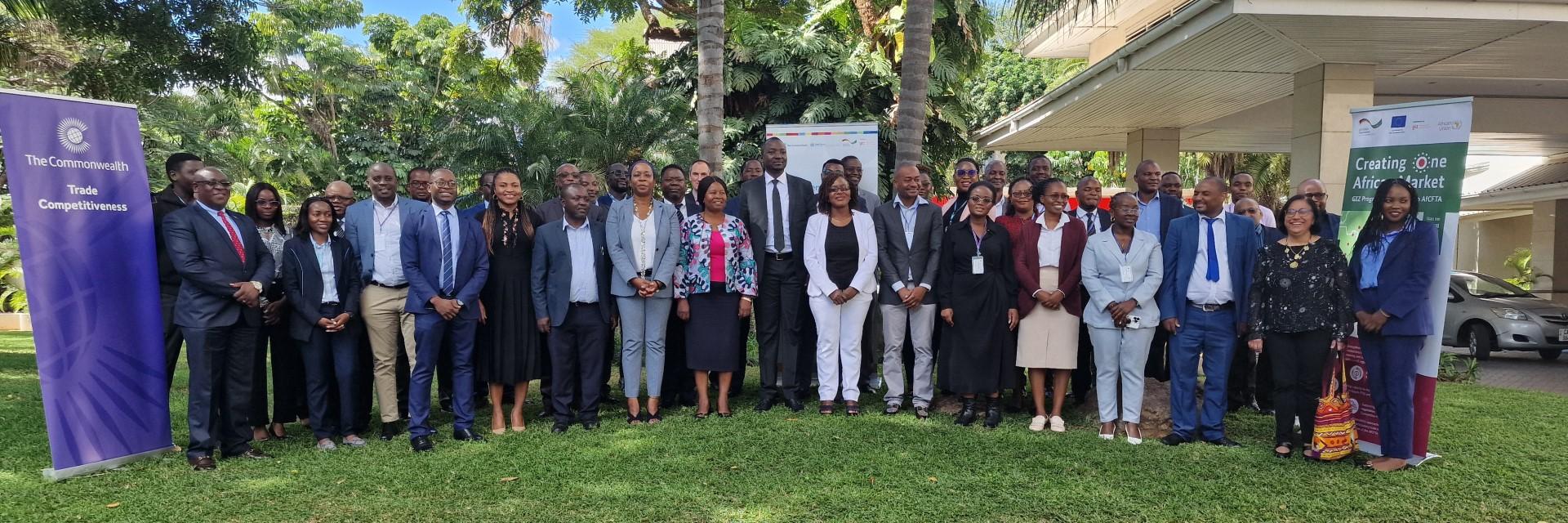Lusaka, Zambia, 2 June 2024 - The Commonwealth Secretariat (COMSEC), the United Nations Economic Commission for Africa (UNECA) and the Deutsche Gesellschaft für Internationale Zusammenarbeit (GIZ), in collaboration with the Zambia’s Ministry of Commerce, Trade and Industry (MCTI), organised a training workshop for trade officials of the MCTI and other government officials, private sector, and civil society organisations.
The training workshop aimed to strengthen the knowledge, skills and capacities of Zambian trade officials in the areas of international trade theory and evidence, trade policy analysis, trade negotiations, and utilization of trade preferences under multiple trade agreements so as to sharpen their abilities to influence and formulate evidence-based trade policy making for promoting economic transformation and sustainable development in Zambia. In addition, the trade officials were capacitated in international trade diplomacy and trade negotiations.
The workshop was officially opened by Ms. Lillian Saili Bwalya, Permanent Secretary, MCTI who indicated that the government of Zambia came up with solutions to reduce import barriers and the workshop should come up with recommendations and information for Zambia to utilise preferential markets.
Ms. Eunice. G. Kamwendo, Director, UNECA Sub-regional office for Southern Africa (UNECA SRO-SA), represented by Ms Olayinka Bandele, emphasised that in Africa trade agreements have articulated big ambitions: ranging from promotion of sustainable and inclusive socio-economic development, enhancing gender equality and structural transformation; to enhancing competitiveness of the economies and industrial development through value addition and economic diversification amongst other objectives. And that these intentions should be implemented.
The Statement by GIZ was delivered virtually by Mr. Guiseppe Scuto, Head of Programme Support to AfCFTA. He stated that GIZ remains committed to strengthening capacity of Member States to negotiate and enable Zambia to trade under the AfCFTA. It aims to help the country position itself in the market through boosting trade.
The Commonwealth Secretariat (COMSEC) represented by Mr. Lawrence Othieno, Trade Advisor concurred with the previous speakers on the importance of supporting Zambia through technical assistance to develop and implement trade not just in the country but in the region. He pointed out that, “we all know that trade is a central driving force behind globalisation and integration among countries and people. With the rise of bilateral and regional trade agreements, countries are in need of human capital to represent the interest of states in negotiations of market access liberalisation and implementation”.
The national capacity building workshop on Trade Policy Analysis, Trade Agreements and Trade Negotiations sessions were facilitated by the trade experts from UNECA Africa Trade Policy Centre (ATPC), the Commonwealth Secretariat, and GIZ. The SADC Secretariat, and Trade Law Centre also contributed to various sessions. Other regional and international institutions and the Development Partners, namely, Common Market for Eastern and Southern Africa (COMESA) Secretariat, the World Bank, UN Trade and Development, and CUTS Zambia also participated in the workshop.
The first day’s sessions were facilitated by Mr. Edward Chisanga, Expert on Trade and Negotiations, on the challenges of Zambia’s Vision 2030 and performance of Africa; Mr. Dale Mudenda, Lecturer from University of Zambia presented on National Trade Policy of Zambia; Ms. Bineswaree Bolaky, Economic Affairs Officer, UNECA SRO-SA explained the trends in Zambia’s regional and global trade and analysed challenges and opportunities in Zambia’s trade; Mr. Wisdom Kaleng’a, Trade Policy Advisor, GIZ presented on the concrete examples of the role of data in trade policy and development, and Mr. Simon Mevel, Economic Affairs Officer, presented on International Trade Policy Analysis: Concepts, Data and Models. He also presented a case study of Zambia’s Regional Digital Trade Regulatory Integration Initiative in Africa and on International Trade Policy Analysis: Illustrations based on selected issues. Ms. Brendah-Phiri Mundia, Principal Economic Affairs Officer, UNECA facilitated training sessions on international trade policy instruments including the Rules of Origin, Regional Value Chains, and Non-Tariff Measures.
The Commonwealth Secretariat represented by Mr. Lawrence Othieno and Ms Azuka Ogundeji, both Trade Advisors, trained the participants on trade policy negotiations including trade policy negotiations simulation. Ms Azuka Ogundeji, presented on digital trade and its implications for trade in Africa, Zambia perspective.
Mr Wisdom Kalenga and Ms. Karita Rejoice both Trade Advisors, GIZ presented on the African Continental Free Trade Area (AfCFTA) along with external experts from the Southern Africa Development Community (SADC) Secretariat, Mr Malcom McKinnon, Senior Trade in Services Advisor, and Ms. Trudi Hartzenberg, Executive Director, Trade Law Center (TRALAC).
The workshop ended with presentations from various institutions, namely, the UN Trade, COMESA, CUTS and the World Bank on their respective work on trade and regional integration in Africa and Zambia.
The National Training Workshop on Trade Policy Analysis, Trade Agreements and Trade Negotiations was commendably attended by more than 50 participants from the public, private sector, and civil societies.
Issued by:
Communications Section
Economic Commission for Africa
PO Box 3001
Addis Ababa
Ethiopia
Tel: +251 11 551 5826
E-mail: eca-info@un.org

